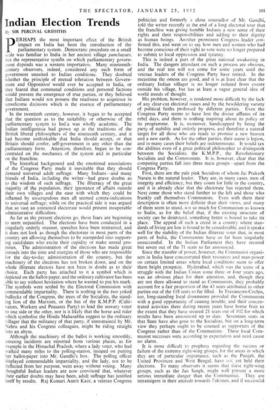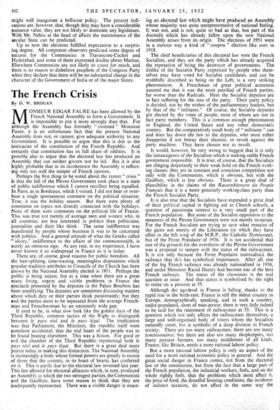Indian Election Tkends
DV SIR PERCIVAL GRIFFITHS pERHAPS the most important effect of the British impact on India has been the introduction of the parliamentary system. Democratic procedure on a small scale was familiar to India in her ancient village panchayats, but the representative systdm on which parliamentary govern- ment depends was a western importation. Many nineteenth- century observers, indeed, considered any such form of government unsuited to Indian conditions. They doubted whether the principle of mutual toleration between Govern- ment and Opposition would ever be accepted in India, or they feared that communal conditions and personal factions would prevent the emergence of true parties, or they believed that Indians would not possess the readiness to acquiesce in unwelcome decisions which is the essence of parliamentary government.
In the twentieth century, however, it began to be accepted that the question as to the suitability or otherwise of the parliamentary system to India was wholly academic. The Indian intelligentsia had grown up in the traditions of the British liberal philosophers of the nineteenth century, and it had become unthinkable that India should accept, or that Britain should confer, self-government in any other than the parliamentary form. Attention, therefore, began to be con- centrated on the mechanics of the system and in particular on the franchise.
The historical background and the emotional associations of the Congress Party made it inevitable that they should demand universal adult suffrage. Many Indians—and many friends of India, including the writer—had grave doubts as to the wisdom of such suffrage. The illiteracy of the great majority of the population, their ignorance of affairs outside their own villages and the ease with which they could be inflamed by unscrupulous men all seemed contra-indications to universal suffrage; while on the practical side it was argued that so vast an untrained electorate would present insuperable administrative difficulties.
As far as the present elections go, those fears are beginning to seem .unjustified. The elections have been conducted in a singularly orderly manner, speeches have been restrained, and it does not look as though the electorate in most parts of the country are allowing themselves to be stampeded into support- ing candidates who excite their cupidity or make unreal pro- mises. The administration of the elections has made great inroads into the time and energies of those who are responsible for the day-to-day administration of the country, but the machinery of the elections has not broken down, and on the whole illiterate electors have not been in doubt as to their choice. Each party has attached to it a symbol which is depicted on the ballot-paper, and the ordinary cultivator has been able to say without hesitation where he wanted to put his mark. 'The symbols were settled by the Electoral Commission with commendable impartiality. There is nothing in the two yoked bullocks of the Congress, the trees of the Socialists, the stand: ing lion of the Marxists, or the but of the K.M.P.P. (Culti- vators, Workers and Peasants Party) to lead the unwary voter to one side or the other, nor is it likely that the horse and rider which symbolise the Hindu Mahasabha suggest to the ordinary villager that the militancy of that party, if unrestrained by Mr. Nehru and his Congress colleagues, might be riding straight into an abyss. . Although the machinery of the ballot is working smoothly, amusing incidents are reported from various places, as for example in the Himachal Pradesh, where a lady voter, who had walked many miles to the polling-station,' insisted on putting her ballot-paper into Mr. Gandhi's box. The polling officer displayed commendable impartiality, and the lady, not to be deflected from her purpose, wept away without voting. Many thoughtful Indian leaders are now convinced that, whatever their earlier doubts may have been, adult suffrage has justified itself by results. Raj Kumari Amrit Kaur, a veteran Congress politician and formerly a close counsellor of Mr. Gandhi, told the writer recently at the end of a long electoral tour that the franchise was giving humble Indians a new sense of their rights and their responsibilities and adding to their dignity as human beings. Another prominent Congress leader con- firmed this, and went on to say how men and women who had become conscious of their right to vote were no longer prepared to submit to local oppression and tyranny.
This is indeed _a part of the great national awakening in India. The dangers attendant on such a process are obvious, and the real test will not come for some years until the veteran leaders of the Congress Party have retired. In the meantime the omens are good, and it is at least clear that the ordinary Indian villager is no longer isolated from events outside his village, but has at least a vague general idea of world trends of thought.
His problem, however, is rendered more difficult by the lack of any clear-cut electoral issues and by the bewildering variety of political faiths professed by different parties. Even the Congress Party seems to have lost the divine afflatus of its rebel days, and there is nothing inspiring about its policy or its programme. It is, moreover, handicapped by being the party of stability and orderly progress, and therefore a natural target for all those who are ready to promise a new heaven and a new earth. As for the other parties, their name is legion, and in many cases their beliefs are indeterminate. It would tax the abilities even of a great political philosopher to distinguish between the Socialists, the K.M.P.P., the Revolutionary Socialists and the Communists. It is, however, clear that the competing parties fall into three main groups—apart from the Congress Party.
First, there are the pale pink Socialists of whom Jai Prakesh Narain is the natural leader. They are, in many cases, men of integrity and efficiency, but they count for little in the country, and it is already clear that the electorate has rejected them. Next come those who stand further to the left and those who frankly call themselves Communists. Even with them their description is often more definite than their views, and many of them seem to stand, not so much for Communism as known to Stalin, as for the belief that, if the existing structure of society can be destroyed, something better is bound to take its place. The appeal of such a creed in a country where stan- dards of living are low is bound to be considerable, and it speaks well for the stability of the Indian illiterate voter that, in most parts of India, the Communists have so far been singularly unsuccessful. In the Indian Parliament they have secured but seven out of the 71 seats so far announced.
Since the transfer of power, however, the Communist organi- sers in India have concentrated their resources and man-power on certain limited areas where local conditions seem to offer them bright prospects. Hyderabad, which was the scene of a struggle with the Indian Union some three or four years ago. was an obvious place for their attention, and, though they are not there allowed to stand as Communists, they probably account for a fair proportion of the 43 seats attributed to other parties out of the 118 seats so far filled. In Travancore-Cochin, too, long-standing local dissensions provided the Communists with a good opportunity of causing trouble, and their concen- trated activities there during recent years have borne fruit to the extent that they have secured 21 scats out of 102 for which results have been announced up to date. Seventeen seats in that State have also gone to the Socialists, but on a long-term view they perhaps ought to be counted as supporters of the Congress rather than of the Communists. These local Com- munist successes were according to expectation and need cause no alarm.
It is more difficult to prophesy regarding the success or failure of the extreme right-wing groups, for the areas in which they are of particular importance, such as the Punjab, the United Provinces and West Bengal, have no yet held their elections. To many observers it seems that these right-wing groups, such as the Jan Sangh, might well ' present a more serious immediate danger than the Communises. They are intransigent in .their attitude towards Pakistan, and if successful might well inaugurate a bellicose policy. The present indi- cations are, however, that, though they may have a considerable nuisance value, they are not likely to dominate any legislature. With Mr. Nehru at the head of affairs the maintenance of the secular State can be predicted.
Up to now the elections fulfilled expectation to a surpris- ing degree. All competent observers predicted some degree of success for the Communists in Travancore-Cochin and Hyderabad, and some of them expressed doubts about Madras. Elsewhere Communists are not likely to count for much, and there is no reason to disbelieve prophets of the Congress Party when they declare that there will be no substantial change in the character of the Government of India or of the major States.



































 Previous page
Previous page